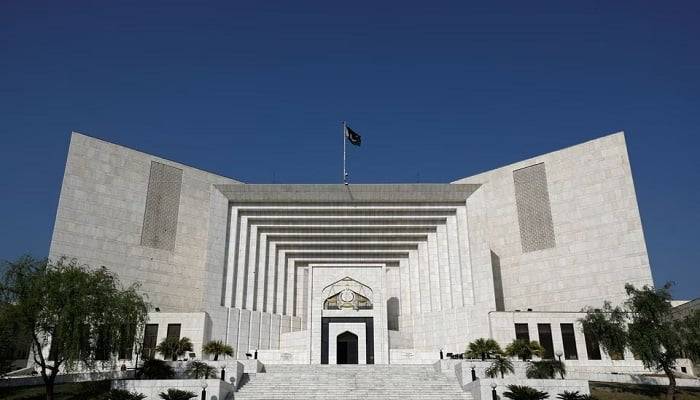Islamabad (Web Desk): The Supreme Court (SC) on Monday declared lifetime disqualification for lawmakers under Article 62(1)(f) of the Constitution null and void with a majority of 6-1.
A seven-member larger bench headed by Chief Justice of Pakistan (CJP) Qazi Faez Isa and comprising Justice Syed Mansoor Ali Shah, Justice Yahya Afridi, Justice Amin ud Din Khan, Justice Jamal Khan Mandokhail, Justice Ali Mazhar and Justice Musarrat Hilali heard the case and reserves the verdict.
The seven-page written order read: “Article 62(1)(f) is not a self-executory provision as it does not by itself specify the court of law that is to make the declaration mentioned therein nor does it provide for any procedure for making, and any period for disqualification incurred by, such declaration.
“There is no law that provides for the procedure, process and the identification of the court of law for making the declaration mentioned in Article 62(1)(f) of the Constitution and the duration of such a declaration, for the purpose of disqualification thereunder, to meet the requirements of the fundamental right to a fair trial and due process guaranteed by Article 10A of the Constitution.
“The interpretation of Article 62(1)(f) in imposing a lifetime disqualification upon a person through an implied declaration of a court of civil jurisdiction while adjudicating upon some civil rights and obligations of the parties is beyond the scope of the said Article and amounts to reading into the Constitution.
“Such reading into the Constitution is also against the principle of harmonious interpretation of the provisions of the Constitution as it abridges the fundamental right of citizens to contest elections and vote for a candidate of their choice enshrined in Article 17 of the Constitution, in the absence of reasonable restrictions imposed by law.
“Until a law is enacted to make its provisions executory, Article 62(1)(f) of the Constitution stands on a similar footing as Article 62(1)(d), (e) and (g), and serves as a guideline for the voters in exercising their right to vote.
“The view taken in Sami Ullah Baloch case treating the declaration made by a court of civil jurisdiction regarding breach of certain civil rights and obligations as a declaration mentioned in Article 62(1)(f) of the Constitution and making such declaration to have a lifelong disqualifying effect amounts to reading into the Constitution and is therefore overruled.
“Section 232(2) added in the Elections Act, 2017, prescribes a period of five years for the disqualification in terms of Article 62(1)(f) and has also made such declaration subject to the due process of law. This provision is already in field, and there remains no need to examine its validity and scope in the present case.
“Syed Ali Imran, the Secretary of the Supreme Court Bar Association (SCBA), stated that the lawyers' body sought to withdraw appeal filed in 2022, therefore, the said appeal and petition are dismissed as withdrawn.
Justice Yahya Afridi, in his dissenting note, said, “For reasons to follow, the extent of lack of qualification of a member of the Parliament, as envisaged under Article 62(1)(f), is neither lifelong nor permanent, and the same shall remain effective only during the period the declaration so made by a court of law remains in force. Therefore, the conclusion so drawn by this court in Sami Ullah Baloch is legally valid, hence affirmed.”
In his dissenting note, Justice Yahya Afridi said that the conclusion drawn by the court in Sami Ullah Baloch Versus Abdul Karim Nousherwani case was legally valid.
“With profound respect, I disagree [with the verdict]. For reasons to follow, the extent of lack of qualification of a member of the Parliament, a envisaged under Article 62(1)(f) of the Constitution of Islamic Republic of Pakistan, 1973, is neither lifelong nor permanent, and the same shall remain effective only during the period the declaration so made by a Court of law remains in force,” he added.
Following the verdict, top political leaders, including Pakistan Muslim League-Nawaz supremo and former premier Nawaz Sharif and Istehkam-e-Pakistan Party (IPP) chief Jahangir Tareen are now eligible for contesting upcoming general elections.
On January 5, the SC had reserved verdict on set of petitions challenging the duration of disqualification of parliamentarians under Article 62(1)(f).
During the hearing, CJP Faez Isa, while favouring the “original Constitution”, lamented "encroachments" made into the country's bill of rights over the years.
“We are disregarding the fact that why these amendments were brought into the Constitution. We are disregarding the fact that the original Constitution has a greater sanctity than amendments brought unless there are such amendments which enable to serve the people better,” the CJP remarked.
During the hearing on January 4, CJP Faiez Isa said that the court was seeking “clarity” on whether the disqualification period for a lawmaker was five years or a lifetime ban under the aforementioned article which deals with the criteria to contest elections.
He remarked that the solution to this matter is present in Islam.
“The Holy Quran mentions that the status of humans is very high,” the top judge said, referring to a verse from Surah Sajda which explains that human beings are not bad but their deeds are.
The chief justice observed that whether the wisdom of five people could abolish the legislation of 326 parliamentarians.
The CJP remarked that the lifetime disqualification was also against Islam. He had stated that the legislation introduced by the elected members of the Parliament could not be seen with hate.


